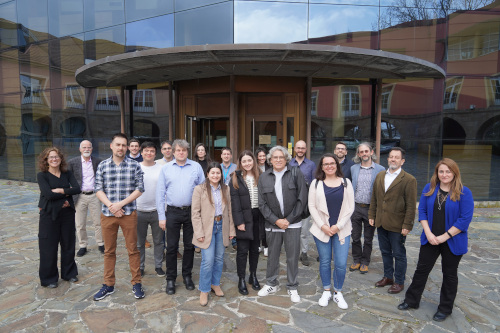Researchers from the CIC biomaGUNE, led by Maurizio Prato (AXA and Ikerbasque Professor), are working on the international FLUFET project, which aims to revolutionise the detection of infectious zoonotic diseases that can jump from animals to humans. The aim of the project, supported by the European Union (through the EIC Pathfinder programme, Horizon Europe) and coordinated by the CICA-UDC, is to develop an automated sensor capable of detecting to detect known and unknown viruses that could pose a threat to global health.
Zoonotic infectious diseases are on the rise, and the risk of a new pandemic is now greater than ever. Future health models must consider the close relationship between human and animal health, and new technologies capable of continuously monitoring where the risk of pathogen transmission is greatest (shared by animals and humans) are urgently needed to avoid the human, socio-political and economic costs of new pandemics.
"One Health" is a global initiative that advocates collaboration between human, animal and environmental health professionals to address health challenges that affect all of these sectors in an interconnected way. It aims to understand and prevent zoonotic diseases and promote a holistic approach to global health.
The European Parliament calls for continuous surveillance and harmonised data collection from animal farms. However, current methods are not suitable for continuous and automatic in-situ detection, so only a limited number of specific and known pathogens are monitored today.
The FLUFET system which is going to be developed in the project will be the first automated sensor capable of continuously detecting a wide range of viral targets, with an unprecedented ability to detect unknown viruses. This sensor will be based on graphene field effect transistors (gFETs). FLUFET will detect infectious zoonotic threats before they spread to humans and cause potential outbreaks, opening the door to continuous prevention of potential pandemics.
Graphene-based field-effect transistors are devices that allow the detection of molecules of interest (proteins, nucleic acids, viruses, etc.) and are based on changes in the conductivity of graphene sheets by interaction with these substances or with other chemical species generated from them.
FLUFET offers exciting opportunities for health and pandemic experts and managers, policy makers and regulatory and standardisation bodies, livestock producers and their associations, precision livestock solution providers, investors and researchers in the many disciplines involved in the consortium.
The project requires an interdisciplinary consortium including partners from computational biophysics, graphene technology, nanotechnology, sensing, microfluidics, virology, surface engineering and sensor design and electronics.
The project kick-off meeting of the project was held on 3-4 April in A Coruña, hosted by the project coordinator, the Universidade da Coruña (UDC). In addition to the UDC’s Centro Interdisciplinar de Química e Bioloxía of the UDC and the CIC biomaGUNE, the participating centres are the BCMATERIALS Foundation - Basque Centre for Materials, Applications and Nanostructures (Bilbao), the International Centre for Genetic Engineering and Biotechnology (Trieste, Italy), the company Graphenea Semiconductor SL (Donostia-San Sebastian), the Laboratorio Ibérico Internacional de Nanotecnología LIN (Braga, Portugal) and the Teknologian Tutkimuskeskus VTT OY (Espoo, Finland).

